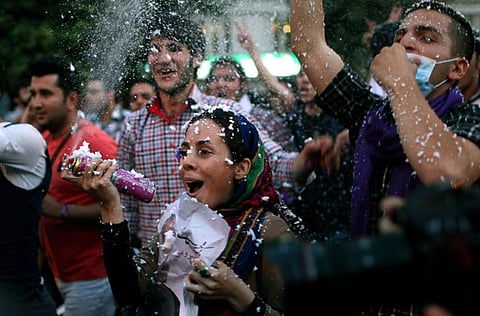A fleeting triumph for Iran reformists
Supreme Leader has the final say on the country’s foreign policy

The surprise emergence of Hassan Rouhani, a portly, softly-spoken cleric, as the victor in Iran’s presidential election contest serves as a timely reminder that for all the setbacks it has endured, the country’s reform movement remains a key player in Iranian politics.
Following the emergence of the reformist Green Movement during the previous contest in 2009, when former prime minister Mir Hussain Mousavi came close to defeating President Mahmoud Ahmadinejad, hardline supporters of Ayatollah Ali Khamenei, the country’s Supreme Leader, have waged a relentless campaign of oppression to crush the protest movement.
Leading reformers such as Mousavi have been placed under house arrest, while thousands of activists have been jailed and tortured. During the run-up to the latest contest, the Revolutionary Guards were reported to have set up a network of secret prisons around the country to detain anti-regime activists.
But despite the regime’s relentless campaign to suppress the opposition, the reform movement has emerged unexpectedly triumphant from the election contest, with the 64-year-old Rouhani winning the more than 50 per cent of the votes required to be appointed the country’s sixth president since the 1979 Islamic revolution.
His victory is all the more surprising given that many Iranians, disillusioned with the corruption of the country’s ruling elite, had been expected to refuse to legitimise the contest by casting their vote. Instead, galvanised by the unexpected emergence of a candidate they felt they could support, more Iranians voted than in 2009 — upwards of 70 per cent, according to official figures.
Leadership style
Mohammed Baqer Qalibaf, the mayor of Tehran, who is believed to have had the Supreme Leader’s personal endorsement in the run-up to the contest, appeared if anything to have suffered as a result. Now, with the Supreme Leader’s congratulations ringing in his ears, Rouhani is due to be sworn in as the new president by Ayatollah Khamenei in a ceremony on August 3.
Assuming Rouhani is anointed as president (rival candidates have three days to lodge complaints about voting irregularities with the Guardian Council before the result is confirmed) we can look forward to a very different style of leadership in Tehran to the eight-year presidency of Ahmadinejad, whose outspoken denunciation of the West only served to increase Iran’s isolation from the outside world.
During this year’s election campaign, Rouhani, who is believed to have studied for a doctorate at Glasgow Caledonian University during the Nineties (though he may have done much of his studying from afar), said he wanted to steer the country on a more moderate course.
During rallies on the campaign trail, he attracted large crowds with his public commitment to free political prisoners, guarantee civil rights and his promise to return “dignity to the nation”. He said he would seek “constructive interaction with the world”, a reference to Iran’s long-standing stand-off over its controversial nuclear programme, and said he would seek to restore diplomatic relations between this Shiite country of 75 million and the US, which were broken off following the seizure of the American embassy in Tehran in 1979.
Political career
But whether Rouhani’s appointment actually results in a radical change in Iran’s relations with the outside world, particularly over its nuclear programme, remains to be seen. While he might portray himself as a moderate, he has spent most of his political career at the heart of Iran’s conservative clerical establishment.
Married with five children, he is a close ally of former president Ali Akbar Rafsanjani, and served on the national security council at a time when intelligence officials believe Iran was working on the development of nuclear weapons, a process that was halted in 2003.
During that time, Rouhani also served as the Supreme Leader’s personal representative on security issues. During student demonstrations against the closure of a reformist newspaper in 1999, Rouhani adopted a tough position, declaring that anyone arrested for sabotage or destroying state property would face the death penalty if found guilty.
His supporters claim his views have mellowed, particularly after the regime’s heavy-handed repression of the reform movement in 2009. But his relationship with Ayatollah Khamenei will be critical in the months that lie ahead. It is the Supreme Leader, rather than the elected president, who has the final say on the country’s foreign policy.
All of which means that, even with the election of a new reform-minded president, Iran may still have a long way to go before it can end decades of international isolation.
— The Telegraph Group Ltd, London 2013
Sign up for the Daily Briefing
Get the latest news and updates straight to your inbox



